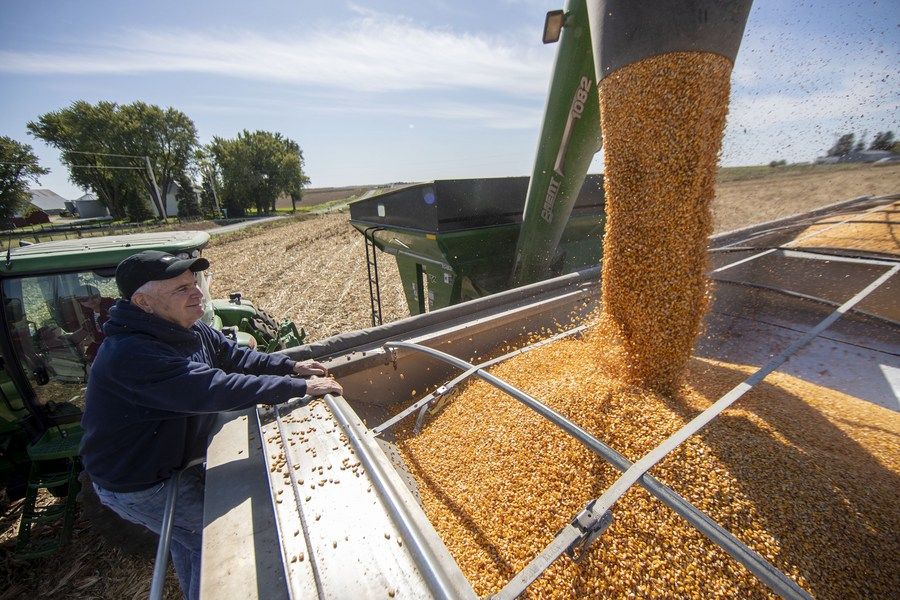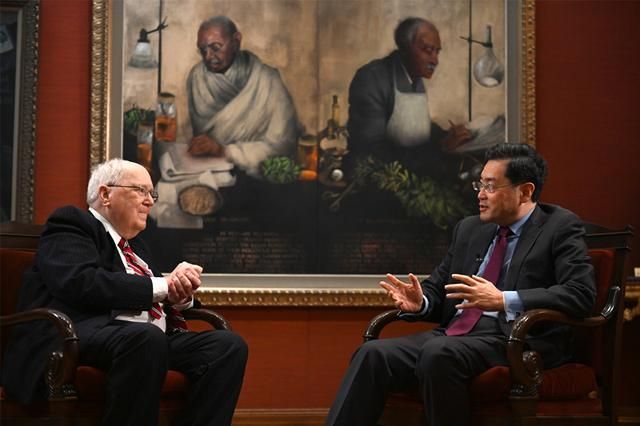Chinese ambassador calls for strengthening ...
Chinese ambassador calls for strengthening China-US agricultural ties

Qin Gang, China's ambassador to the US, stressed the significance of agricultural cooperation between the US and China, two major powers in agriculture and agricultural trade, on Thursday.
He encouraged more cooperation and exchanges in this area to benefit both sides and improve global food security.
Qin attended the US-China High-Level Agricultural Dialogue, hosted by the Chinese embassy in the US, the US Heartland China Association, and the China Agricultural Association for International Exchange, in Des Moines, the capital of Iowa.
The Chinese ambassador gave the keynote speech to a large audience of farmers, business people, and high-level officials.
Qin described his trip to the US heartland as "a journey of heart" aiming to "help establish amicable relations and trust" and "help enhance agricultural and rural ties",
"China is the world's biggest agricultural importer, and the US the largest exporter. When Chinese people's aspiration for a better life meets US quality agricultural products and advanced agricultural technologies, new potential emerges for agricultural cooperation. Strategically speaking, promoting win-win agricultural cooperation will not only improve the variety of food supply for the Chinese people and increase the income of American farmers, but also make global food supply more stable and certain, and contribute to the global fight against climate change," said Qin.
Qin said the agricultural transition could provide new opportunities to US-China cooperation. "The US agriculture is going through low-carbon and green transition, where farmers apply advanced technologies and methods for carbon capture and storage, and use quality feeds to reduce methane emission. China has set the targets of reaching carbon peak before 2030 and carbon neutrality before 2060. To realize these targets, it is necessary to utilize advanced technologies, experience and seeds to address climate change in agriculture. This will definitely create new opportunities for China-US agricultural cooperation."
The ambassador said in the past two years, China has made tremendous efforts to implement the phase one trade deal fully. He stressed that China has not used the force majeure clause despite the pandemic and has even adopted a market-based exclusion process for the countermeasure tariffs on US agricultural products. "This fully shows our sincerity and goodwill," he said.

Qin noted that in 2021, bilateral agricultural trade reached $46.4 billion, hitting a record high, and that China's agricultural imports from the US stood at $38.85 billion, a growth of 64.8 percent from an already high base in 2020.
Such a rate was higher than the 28.6 percent growth of China's agricultural imports from the world, and much higher than the 23.3 percent growth of US exports to the world.
According to the US Export Report 2022 recently issued by the US-China Business Council, as China implemented the phase one trade deal, US farmers exported billions of dollars more in oilseeds and grains and over a billion dollars more in meat products, which improved the wellbeing of farmers in America's heartland.
"Facts have proved that China-US economic and trade relations are win-win in nature, and to restore normal trade ties between the two countries as soon as possible is the shared call of both sides," the ambassador said.
Qin discussed the US-China cooperation on the issue of food security. "As we face a complex and severe situation in agricultural development and food security worldwide, I firmly believe that China and the US, as major agricultural producers, consumers and traders, should meet challenges together, maintain stable development of agriculture, enhance the resilience of agricultural supply chains, ensure food security domestically, and promote cooperation for international food security. This will certainly be helpful for maintaining world peace, promoting global economic development and social stability, and delivering sustainable development."
"Let's bear in mind: no food, no stability, no peace," Qin stressed.
The ambassador mentioned that during the World Food Prize Foundation building tour, he saw the name of Yuan Longping, a well-known Chinese agricultural scientist, among all the names of the World Food Prize laureates.
"Mr Yuan once famously said, 'Be a good seed.'This was not only the cause of his lifetime but also a portrayal of his integrity and big heart as a person," said Qin. "With Mr Yuan's teaching in mind, I have come to Iowa, the heart of America and the warmth and friendship of the people in Iowa touches my heart, and my heart also goes to the people in Iowa. "
"Let's work together, in this sowing season, for the future of China-US relations, for the wellbeing of our two peoples, and for becoming a good seed, with heart!" Qin concluded.

Around 500 people attended the forum held both offline and online, including Shi Qingshan, the vice-governor of Hebei province; ambassador Kenneth Quinn, honorary chairman of the World Food Prize Foundation; Terry Branstad, former US ambassador to China; Nicholas Burns, current US ambassador to China; and officials from the agricultural departments of both countries and relevant agricultural associations and enterprises. Terry Branstad; Paul Fribourg, the chairman and CEO of ContiGroup Companies; Erik Fywald, CEO of Swiss agricultural giant Syngenta; Ryan LeGrand, president and CEO of the US Grains Council; Jim Sutter, CEO of the US Soybean Export Council; they all expressed their expectation on US-China friendship and cooperation, calling for more bilateral exchanges and deeper mutual trust. Others in attendance also celebrated the shared willingness to see more agricultural cooperation continue to move forward and overall relations between the two countries return to a positive and productive track.
During the forum, the Iowa Corn Growers Association announced a major import order for US corn from China. The China Agricultural Association for International Exchange and the Heartland China Association signed a memorandum of agricultural cooperation that sparked an enthusiastic response from the audience.
Earlier the same day, Quinn guided the Chinese ambassador around the World Food Prize Foundation building, explaining the Chinese elements and historical origins of the building, including the "soybean", one of the four major crops of humankind, written in Chinese characters on the lobby pillars, and the "Da Yu" engraved on the roof; Da Yu, a Chinese historical figure, has contributed to human agriculture. There was also the plaque of professor Yuan, and the golden plaque commemorating President Xi Jinping's speech here in 2012. Quinn also highlighted one of the most famous paintings in the gallery, "Two Interesting Stories: President Xi Jinping and His Farther Xi Zhongxun" based on Quinn's own memorable experiences hosting Xi and his father's visits to Iowa in 2012 and 1980, respectively.
After the visit, Qin and Quinn had an in-depth conversation on Iowa's friendship with China, the development of the US-China relationship over the past 40 years, and economic and trade and people-to-people exchanges between Iowa and Hebei.
Qin appreciated Quinn's contribution to promoting US-China friendship, cooperation, and world food security. Qin said that Iowa is unique in US-China relations, and the friendly provincial-state relationship between Hebei and Iowa is a pioneer and model. Qin stressed that the US and Iowa agricultural exports to China had grown rapidly in recent years. The two sides have great potential to complement each other in agricultural cooperation, improve production efficiency and protect the global environment, to benefit both countries and the world's people.
Qin noted that as two major countries, China and the US have the responsibility to work together to address the challenges of global food security as a result of regional conflicts and climate change, bringing more certainty and security to the world.
By YIFAN XU in Washington | chinadaily.com.cn